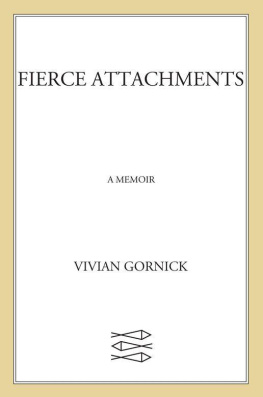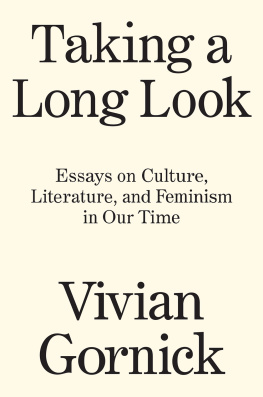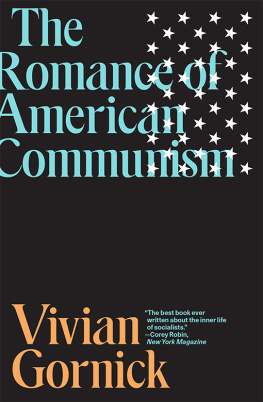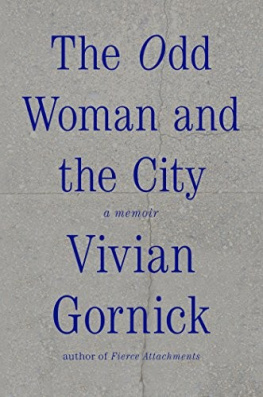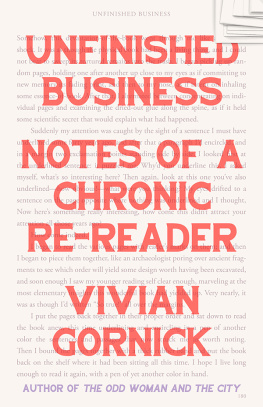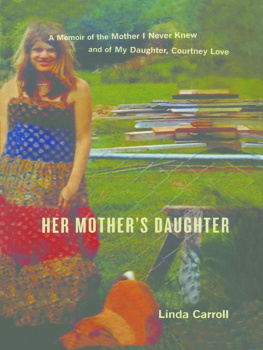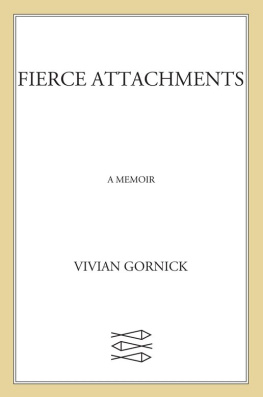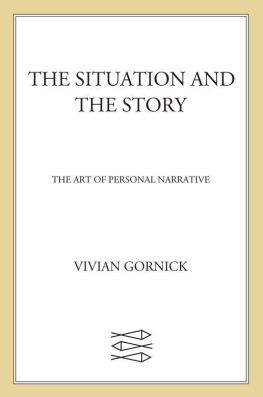by Jonathan Lethem
Preparing to introduce a book youve loved for years, you might find yourself leafing through the previous edition, turning it in your hands as well as plunging in to reencounter certain sentences and marvel again at their slant and freshness, their capacity for permanent surprise. You might also flip to the beginning, hoping to discover that your introductions already there, already writtenwhich is the feeling that this artifact has given you time and time again: that it knows your thoughts. The book is an object in furious motion, humming with its own energy, and all you might wish to do is touch it, alter its trajectory barely, so as to nudge it into universal view.
Couldnt I just say that you must read Vivian Gornicks Fierce Attachments ? That I am here to insist this book become a banner in the wide world, as it is a banner already in my mind, one I march behind? And yet, cradling this earlier edition, I notice eight endorsements, all quite eloquent, all by women; could it somehow be that I am the first man to testify for this book? (I check an earlier edition, also on my shelf, and of course this isnt actually the case.) Vivian Gornicks memoir has that mad, brilliant, absolute quality that tends to loft a book out of context, then cause it to be admired, rightly, as timeless and classic. Yet it is a memoir centered, at least apparently, on the intricacies of a mother-daughter relationship, a memoir written in the eighties (before the boom) by a writer associated, proudly ifunsimply, with the Feminist movement. Is it mine to love, then, let alone to brandish as a piece of my own heart? Yes. The readers path into the entrancement of Fierce Attachments is neither by way of gawking curiosity about the specifics of Gornicks or her mothers life, nor by the easy identification that depends on resemblanceon overlapping circumstancesnot even the resemblance of femaleness.
Identification, in Fierce Attachments , works another way. Immersing ourselves in the books searing yet seemingly offhand honesty, we find that we simply become Vivian Gornick (or the speaker bearing her name), just as we become her mother, and then Nettie Levine, the passionate and nihilistic young neighbor who emerges as the books third major character, forming with mother and daughter what Richard Howard has called that affective, erotic plot by which, just so, we triangulate our lives.
Yet our sense of transubstantiation isnt limited to these three. Gornick draws us into brief, scalding alliances with three men, lovers and husbands along the path of her self-uncovering: Stefan, Davey, and Joe. And too, passingly, with a half-dozen other neighbors in the Bronx, and a psychiatrist, and of course the elusive father. By giving every actor in turn eyes with which to see the narrator who has seen them, and voices to rival the narrators in acuity, however briefly, Gornick has burned these figures onto the page. Not only does no one escape her gaze, but she escapes no one elses. Im not speaking of fairness, an overrated virtue in literature, and perhaps in life as well. Gornick might be said to demolish her cast of players, but by that standard she also demolishes herself. I prefer to say that like a magician pulling the tablecloth from under atable full of settings, she miraculously leaves herself and her cast intact, and shining with what I suppose can only be described as love. Tough love; thats what they call it.
This would probably be a fine place to quit, only Im driven to give just a bit more of a writerly tribute, and a personal one, to the memoirist and essayist who along with Phillip Lopate and Geoff Dyer taught me whatever I know about flaying the bullshit from sentences about myself. I hate to saddle her with the epithet writers writer, but Fierce Attachments demands honor as the work of a breathtaking technician, one whose control of a distilled form of scene and dialogue, of withheld punch lines, and of the use of the white spaces on the page, makes me still wonder why she has never tackled fiction, the love of which she so eloquently professes in her critical essays. Like much of the writing I love most, Fierce Attachments draws strength from the method of paradox. These pages contain my favorite description of a would-be writers realization that she simply is a writer, for better or worse and no matter how unclear the path before her:
In the second year of my marriage the rectangular space made its first appearance inside me. I was writing an essay, a piece of graduate-student criticism that had flowered without warning into thought, radiant shapely thought. The sentences began pushing up in me, struggling to get out, each one moving swiftly to add itself to the one that preceded it. I realized suddenly that an image had taken control of me: I saw its shape and its outline clearly. The sentences were trying to fill in the shape. The image wasthe wholeness of my thought. In that instant I felt myself open wide. My insides cleared out into a rectangle, all clean air and uncluttered space, that began in my forehead and ended in my groin. In the middle of the rectangle only my image, waiting patiently to clarify itself. I experienced a joy then I knew nothing else would ever equal.
Later in the book, Gornick seems to mourn the inability of this rectangle to thrive, expand, encompass more of her life. The paradox is double: by the evidence of the book in your hands, the very book that describes this resistance and frustration, Gornicks rectangle has done precisely that, grown to encompass not only her life but, for the duration of the book, her readers. And yet for all it encompasses, it remains exactly as intimate and local as her first description of its appearance: exactly the size of her body.
JONATHAN LETHEMS novels include The Fortress of Solitude and Motherless Brooklyn , which won the National Book Critics Circle Award. He is also the author of Men and Cartoons, a collection of short stories; and The Disappointment Artist , a book of essays. He lives in Brooklyn.
Im eight years old. My mother and I come out of our apartment onto the second-floor landing. Mrs. Drucker is standing in the open doorway of the apartment next door, smoking a cigarette. My mother locks the door and says to her, What are you doing here? Mrs. Drucker jerks her head backward toward her own apartment. He wants to lay me. I told him hes gotta take a shower before he can touch me. I know that he is her husband. He is always the husband. Why? Hes so dirty? my mother says. He feels dirty to me , Mrs. Drucker says. Drucker, youre a whore, my mother says. Mrs. Drucker shrugs her shoulder. I cant ride the subway, she says. In the Bronx ride the subway was a euphemism for going to work.
I lived in that tenement between the ages of six and twenty-one. There were twenty apartments, four to a floor, and all I remember is a building full of women. I hardly remember the men at all. They were everywhere, of coursehusbands, fathers, brothersbut I remember only the women. And I remember them all crude like Mrs. Drucker or fierce like my mother. They never spoke as though they knew who they were, understood the bargain they had struckwith life, but they often acted as though they knew. Shrewd, volatile, unlettered, they performed on a Dreiserian scale. There would be years of apparent calm, then suddenly an outbreak of panic and wildness: two or three lives scarred (perhaps ruined), and the turmoil would subside. Once again: sullen quiet, erotic torpor, the ordinariness of daily denial. And Ithe girl growing in their midst, being made in their imageI absorbed them as I would chloroform on a cloth laid against my face. It has taken me thirty years to understand how much of them I understood.

